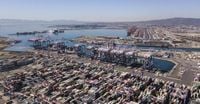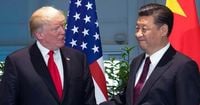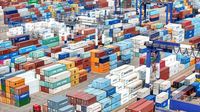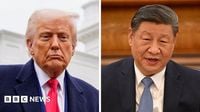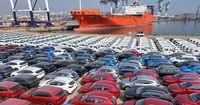China has announced a sweeping retaliatory measure against the United States, imposing a 34 percent tariff on all U.S. imports starting April 10, 2025. This move comes in response to President Donald Trump’s recent imposition of similar tariffs on Chinese goods, marking a significant escalation in the ongoing trade tensions between the two nations.
On April 3, 2025, Trump unveiled a new tariff package that included a 34 percent tariff on all Chinese imports, building on previous tariffs that had already raised the total to 54 percent for many products. The Chinese government responded swiftly, declaring that the U.S. actions "seriously undermines China’s legitimate rights and interests" and labeled the tariffs as "a typical unilateral bullying practice." This retaliation is poised to deepen the ongoing trade war, which has already begun to impact global markets.
As part of its countermeasures, China is not only implementing tariffs but also restricting the export of various rare earth elements crucial for technology and medical applications. The Chinese Ministry of Finance announced that the tariffs would take effect the same day that Trump’s tariffs were set to be implemented, indicating a tit-for-tat approach that could have far-reaching implications for both economies.
In addition to tariffs, China has added 16 U.S. companies to its export control list, prohibiting them from receiving certain goods and services from China. Among those targeted are firms in the aerospace and defense sectors, including High Point Aerotechnologies and Sierra Nevada Corporation. Furthermore, 11 additional companies have been designated as "unreliable entities" due to their military collaboration with Taiwan, which China deems a serious threat to its national security.
The situation escalated further as China filed a formal complaint against the U.S. at the World Trade Organization (WTO), arguing that the new tariffs violate international trade rules. The complaint underscores Beijing's commitment to countering what it perceives as aggressive trade policies from Washington.
Trump, meanwhile, showed no signs of backing down. In a social media post, he claimed that China had "played it wrong" and that their panic would not deter his administration's policies. His remarks came as U.S. stock markets reacted negatively to the news of China’s retaliatory tariffs, with the Dow Jones Industrial Average plummeting over 1,000 points, marking one of its worst days in recent history.
Global markets have been on edge as the trade war escalates. The S&P 500 index fell nearly 5 percent in a single day, while European stocks followed suit, with major indices in Frankfurt and Paris dropping significantly. The turmoil has prompted concerns about a potential economic recession, with experts warning that the risk is now "uncomfortably high." Allianz’s Chief Economic Advisor Mohamed El-Erian noted that the situation could shave up to 2.5 percentage points off China’s economic growth for the year.
In Japan, Prime Minister Shigeru Ishiba echoed these concerns, calling the tariffs a "national crisis" and highlighting the potential impact on the Japanese economy, which is closely tied to both the U.S. and China. As global investors weigh their options, the European Union has signaled a readiness to engage in talks with the U.S. to avoid further escalation.
The ramifications of these tariffs extend beyond just the U.S. and China. Other countries are closely monitoring the situation, with some considering their own responses. For instance, Canada has already implemented a similar tariff on U.S. imports in retaliation for Trump’s measures.
The stakes are high as the world watches this trade war unfold. The U.S. runs a significant trade deficit with China, heavily relying on imports from the Asian giant. This interdependence complicates the situation, as both sides must navigate the delicate balance between protecting their economic interests and maintaining international trade relationships.
In a statement, the Chinese Commerce Ministry emphasized that the export controls on rare earth elements are meant to safeguard national security and fulfill international obligations. These elements are critical for various industries, including electronics and aerospace, making them a strategic asset in this trade conflict.
As the trade war intensifies, analysts warn that businesses with supply chains in China will face increasing challenges. The unpredictability of tariffs and trade policies could lead to significant disruptions in global supply chains, affecting everything from technology to agriculture.
In summary, the imposition of 34 percent tariffs by China on U.S. imports marks a pivotal moment in the escalating trade war between the two largest economies in the world. With both sides digging in their heels and showing no signs of compromise, the global economic landscape may be forever altered.
